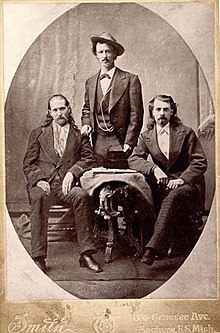Bill Hickok Poker

The Wild Bill Hickok Method of Poker Playing: Cheat to Win and Never Pay Out When You Lose Wild Bill Hickok. The very name conjures up images of dusty trails and pearl-handled revolvers and long blond locks and card games and why a cheater should never sit with his back to the door. While in Deadwood, South Dakota, Wild Bill Hickok became a regular poker player at Nuttal & Mann's Saloon. On the afternoon of August 2, 1876, he was playing cards with his back to the door.
James Butler Hickok, born on May 27 1837 and famously nicknamed “Wild Bill Hickok”, was a heroic figure of America’s Old West. Aside from being an expert gunfighter and reputable lawman, Hickok was also a legendary gambler – his favorite game being Draw Poker. It was during the years following the Civil War that Hickok spent most of this time developing his poker skills, and he eventually came to be a professional player. However, it was Hickok’s gambling that lead him to his unfortunate end.
On August 2nd back in 1876, Hickok decided to head over to the Nuttal & Mann’s Saloon No. 10 in the black Hills of Deadwood in Dakota for a game of poker. Hickok was known to sit in the corner of the room so that he could foresee any attacks, yet this night his usual seat had been taken. Though every gambler knows better than breaking a lucky habit, he instead sat with his back to one door and faced another, and despite the game he could not manage to overcome the dread of being in the firing line.

Wild Bill Hickok Poker Hand Images

Unfortunately, Hickok’s paranoia was vindicated – in the middle of his game, a hunter by the name of Jack McCall shouted “take that” and shot Hickok in the head with a brutal .45 caliber revolver. At the moment that he was shot, Hickok is believed to have held a pair of Aces, a pair of eights and a fifth card whose value disputed – some say it is unknown or was not yet dealt. It is for this reason that until today, Aces and Eights are morbidly called the “Dead Man’s Hand”.
People are still not sure what McCall’s motive was for killing Hickok. The most widely accepted story has to do with a dispute between the two men over gambling losses; the previous day, McCall had lost all his money to Hickok in a game of poker and couldn’t afford to buy himself breakfast. Hickok offered him money to pay for a meal, which apparently McCall received as a backhanded insult, or a condescending offer from Hickok. When he showed up at the Saloon the following day, he was drunk and still bitter at Hickok, and just shot him there and then.
A jury comprises primarily of miners held a trial soon after the murder, where McCall was mysteriously acquitted of the murder after confessing that he was avenging the death of his brother (caused obviously by Hickok). The papers that day disparaged the jury for what they believed to be a wrong decision. And indeed, after bragging about his sin, McCall was re-arrested and put back on trial. This time, McCall was found guilty and hanged. Following the execution it was discovered that he didn’t have a brother at all – probably the luckiest bluff of his life.
Since his death, Hickok has become a mythical American figure, but recently he has also become a posthumous poker legend. More than 100 years later when the poker industry began to really boom (1979), Wild Bill Hickok was inducted into the Poker Hall of Fame, as one of the only 3 players who have died whilst playing poker.